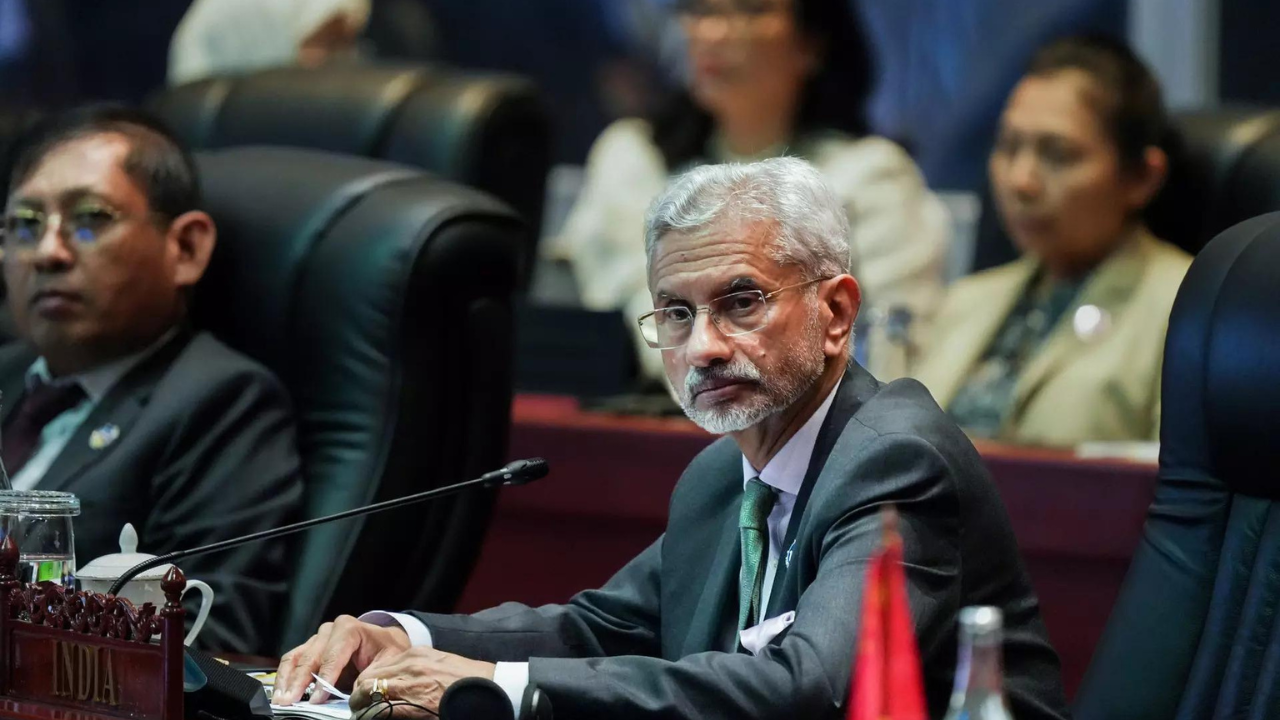VIENTIANE (LAOS): External affairs minister S Jaishankar on Saturday stressed the need for a substantive and effective code of conduct to secure sea lines of communication in South China Sea which he said are critical for peace and stability of the Indo-Pacific region, amid growing concerns about China’s maritime coercion.
Addressing the 14th East Asia Summit Foreign Ministers Meeting in Laos’s capital Vientiane, he said India will contribute towards a stronger EAS process and uphold ASEAN unity and centrality through our Act East Policy.
On maritime security, he said: “The Sea Lines of Communication (SLOC) passing through South China Sea are critical for peace, stability, prosperity and development of the Indo-Pacific region.”
“The code of conduct should be substantive and effective, consistent with international law and should not prejudice legitimate rights and interest of nations not party to discussions,” he said. His comments hold significance as his Chinese counterpart Wang Yi is also in Vientiane to attend the summit.
The resource-rich South China Sea in the Indo-Pacific region is widely seen as a potential flashpoint for global conflict. China claims most of the South China Sea as its own, while The Philippines, Vietnam, Malaysia, Brunei and Taiwan have counterclaims over the maritime area.
Southeast Asian countries are trying to reach an agreement with China on a code of conduct to avert confrontations in the South China Sea.
At the meeting, Jaishankar also called for de-escalation and restraint in Gaza. “India continues to extend humanitarian assistance to the people of Palestine,” he said.
Jaishankar has also expressed concern over the attacks against commercial vessels in the Red Sea.
Addressing the 14th East Asia Summit Foreign Ministers Meeting in Laos’s capital Vientiane, he said India will contribute towards a stronger EAS process and uphold ASEAN unity and centrality through our Act East Policy.
On maritime security, he said: “The Sea Lines of Communication (SLOC) passing through South China Sea are critical for peace, stability, prosperity and development of the Indo-Pacific region.”
“The code of conduct should be substantive and effective, consistent with international law and should not prejudice legitimate rights and interest of nations not party to discussions,” he said. His comments hold significance as his Chinese counterpart Wang Yi is also in Vientiane to attend the summit.
The resource-rich South China Sea in the Indo-Pacific region is widely seen as a potential flashpoint for global conflict. China claims most of the South China Sea as its own, while The Philippines, Vietnam, Malaysia, Brunei and Taiwan have counterclaims over the maritime area.
Southeast Asian countries are trying to reach an agreement with China on a code of conduct to avert confrontations in the South China Sea.
At the meeting, Jaishankar also called for de-escalation and restraint in Gaza. “India continues to extend humanitarian assistance to the people of Palestine,” he said.
Jaishankar has also expressed concern over the attacks against commercial vessels in the Red Sea.
Related posts:
Nepali Prime Minister Oli complains of chest pain, admitted to hospital |...
Video of 4 Girls On a Single Scooty in Mumbai Viral
10 killed, dozens wounded in a mass shooting at Prague university- The New Indian Express
NGT fines Karnataka Rs 2,900 crore for lapses in waste management | India News
Families, friends struggle to cope after Seoul crush- The New Indian Express
ISI training terror groups in Myanmar | म्यांमार में आतंकियों को ट्रेनिंग...
Wagner mercenary boss Yevgeny Prigozhin killed in plane crash
Assam to abolish 8,000 vacant school teacher posts; opposition fumes- The New Indian...
Protests in Mexico as controversial judicial reform passed
Chinese lab leak or emerged in animals?: Origins of Coronavirus still a mystery- The New.....

